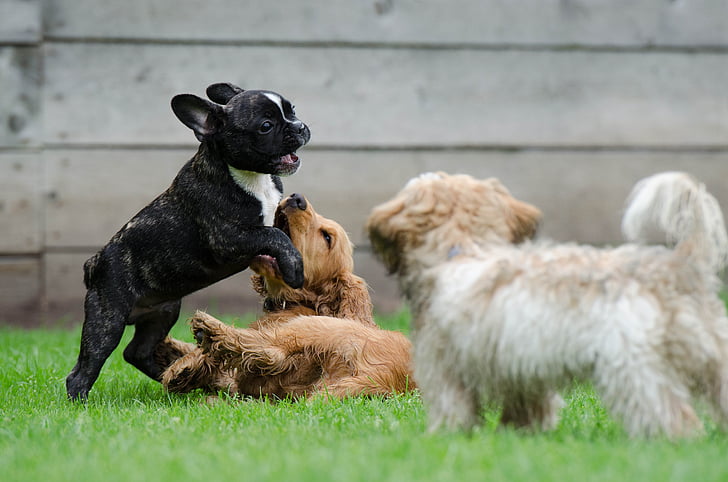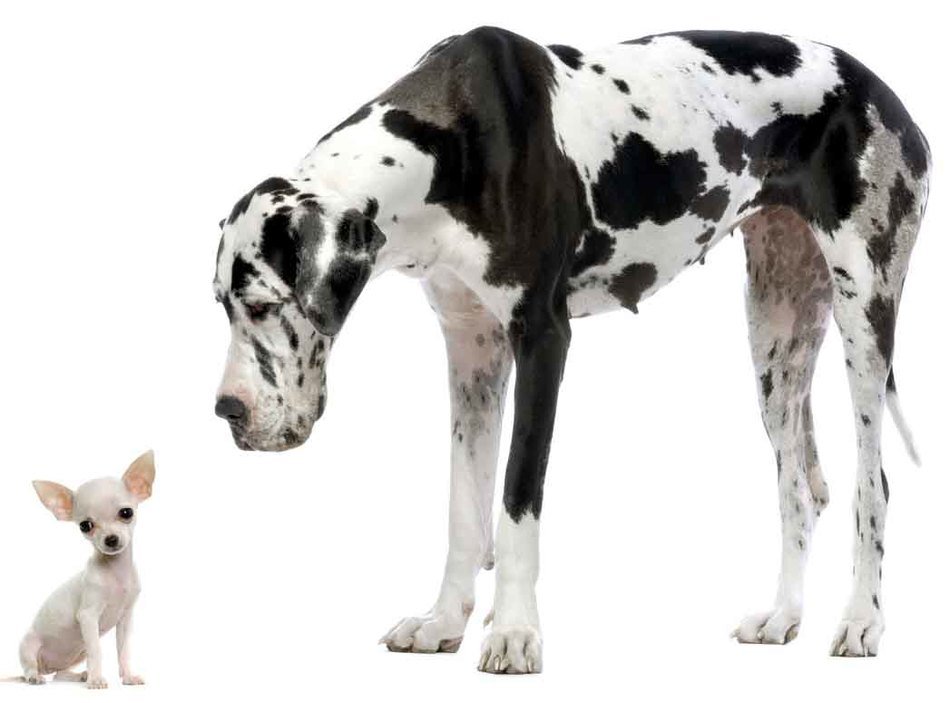Written by Laure-Anne Viselé (BSc, MSc, PG Dip., O&O), Zoologist and dog behaviour therapist
22 September 2020
“I want to lodge a complaint about your puppy class. I expected my pup would be playing around with other pups every week and, not only don’t you do that in class but we are even asked to keep 2 meters’ distance between the dogs. I am very disappointed.”
That e-mail cut deep. We try hard to make it clear before clients register: puppy class = school time and not play time.
It felt so unfair. We would love to allow free play. It would be so fun and cute and the clients would love it. It is hard to resist given the commercial pressure, but responsible dog training schools say no to free play.
Why is that?
What do I mean with ‘free play’?
Let’s start with: what is ‘free play’? It means allowing all the pups (sometimes 10+ pups) to play together all at the same time with little to no staff supervision before or after every class.
This is why free play is a terrible idea:
Puppy fight club
Rough play can traumatise the underdog with every second it is allowed to go on.
We had a client cry out for a spot with us because their current dog training school had allowed free play and, she had to watch her dog being pinned to the ground by a larger dog as the instructors looked on.
How can one instance of rough play (not even physical injury) be enough to traumatise? It is because pups are like sponges: every emotion they feel in a situation tells them how to feel about that situation from now on.
- Bad experience at the vet’s? The vet’s is bad.
- Bad experience in the car? Car rides are bad.
- Bad experience playing with a black dog? Bad dogs are scary.
I hear you think: “Huh? But my puppy has just had a nasty encounter with a large dog and he is fine with them.” We have two possibilities here: either you got lucky and your puppy is pretty resilient or (most likely) the problem will only pop up at adolescence.
How do I know? As a behaviourist, I do my fair share of behaviour analysis. As part of that process, we look at what happened in a dog’s past that could have contributed to his aggression towards other dogs. More often than not, the only bump in the road was being the victim of rough play as a pup.
All you need to traumatise a pup is to force him in a scary situation long enough that they notice they can’t escape. It’s that easy.
The one-eyed leading the blind
Clients often want puppy play to teach their pup social kills. It is unlikely, however, that their pup will come out with refined social skills after playing with an equally socially inept pup.
Puppies are terrible role models for each other: they still have to learn themselves.
Socialisation to other dogs is much more effective when you let your pup play with socially skilled adult dogs; dogs who correct rude behaviour appropriately (not too much, not too little), and dogs who master these two essentials play skills:
- They can adapt their energy/speed/size to the other dog.
- They regularly (every few seconds) stop to check if the other dog is still into it.
Back when we were experimenting with puppy play, this is what would inevitably happen:
- The larger pups pinning the smaller ones down to the ground and not letting go.
- The more energetic pups getting more and more wound up and biting harder and harder as play goes on.
It was starting to feel like we were playing Russian roulette with the pups’ mental health just because people expect play during puppy class.
It’s a game of frustration
If your pup has been allowed to play during puppy class, there is a big chance he’ll get frustrated when it’s time to focus on serious exercises.
All they want to do, then, is get to play with the other dogs again. Some end up so frustrated they need to leave class to cool off as all they can do is stare at the other pups and whine in frustration for the whole lesson.
This is fun for neither you, nor the instructor but, more importantly, this is really not fun for the poor pup.
When it comes to play moments, it is best the pup knows where he’s at: play is for specific times and specific places; definitely not when he is on the lead and most definitely not during puppy class.
Matching is serious business
If you think I let my (adult) dog play with every random dog we meet, you are yet to realize quite how cautious us dog behaviourists are about our dog’s mental health.
Before I let my dog play with another dog, I first check how that dog plays with other dogs from a distance. If I like what I see of his play skills, I might give it a go.
I check for a dog who:
- Does not overreact when things temporarily get a bit too rough.
- Does not overwhelm or bully more insecure/smaller dogs.
- Seems relaxed and happy to be there, not a nervous wreck.
I also check for size: if there is a size mismatch, I will also first look at how that dog handles the size difference when playing with, say, a Lab-sized dog.
The other day, we bumped into a Chihuahua and into a Great Dane. On both occasions, I first checked and saw how they reacted to Lab-sized dogs before unclipping the lead. I asked myself:
- Would the Chihuahua freak out when the larger dog chased him or approached him from above?
- Would the Great Dane self-handicap, making sure he did not overwhelm or intimidate the smaller dog?
The matching process in class needs to be even more rigorous. It is DEFINITELY not a case of: “Let’s all unclip their leads at the same time and see what happens.”
We still do give a puppy play lesson during group classes, by the way. But this is done during ONE lesson:
- Which is heavily supervised,
- Where play is not allowed to get too het up
- Where we carefully hand-pick 2-3 compatible playmates according to energy level, size and temperament.
Definitely not a free-for-all puppy scrum.
Traumatising pups en-masse: not a bad business model
We are here to help you raise a happy, well-behaved dog so it would be a good idea to avoid traumatising your pup in the process, no matter how much commercial pressure on us to do so.
Maybe we have it all wrong, come to think of it: we also sell behaviourist services so the more traumatised pups the better, right?
Oh wait. Ethics…
Read more about the puppy class
Picture credits
- Boxing match: Courtesy of Wikilmages via Pixabay. License: Pixabay License. No modifications made.
- Puppies playing on grass: From PickPic. License: Royalty-free photos. No modifications made.
- Chihuahua & Great Dane: From Pixy#Org. License: CC0. No modifications made.



